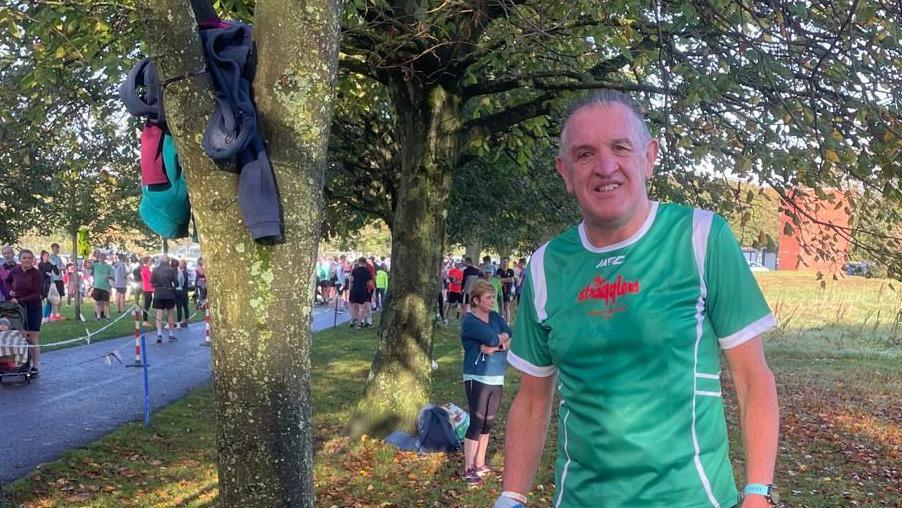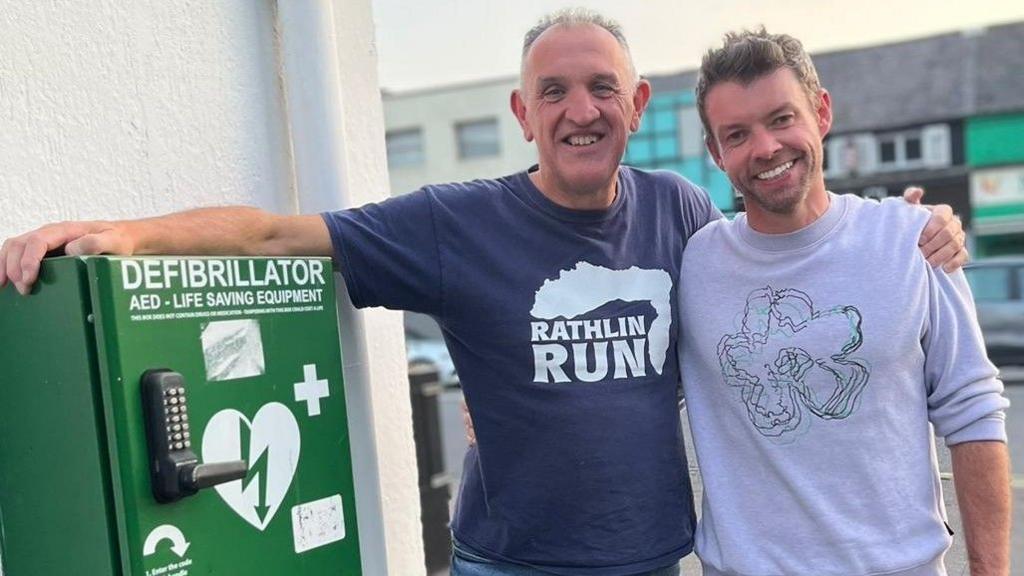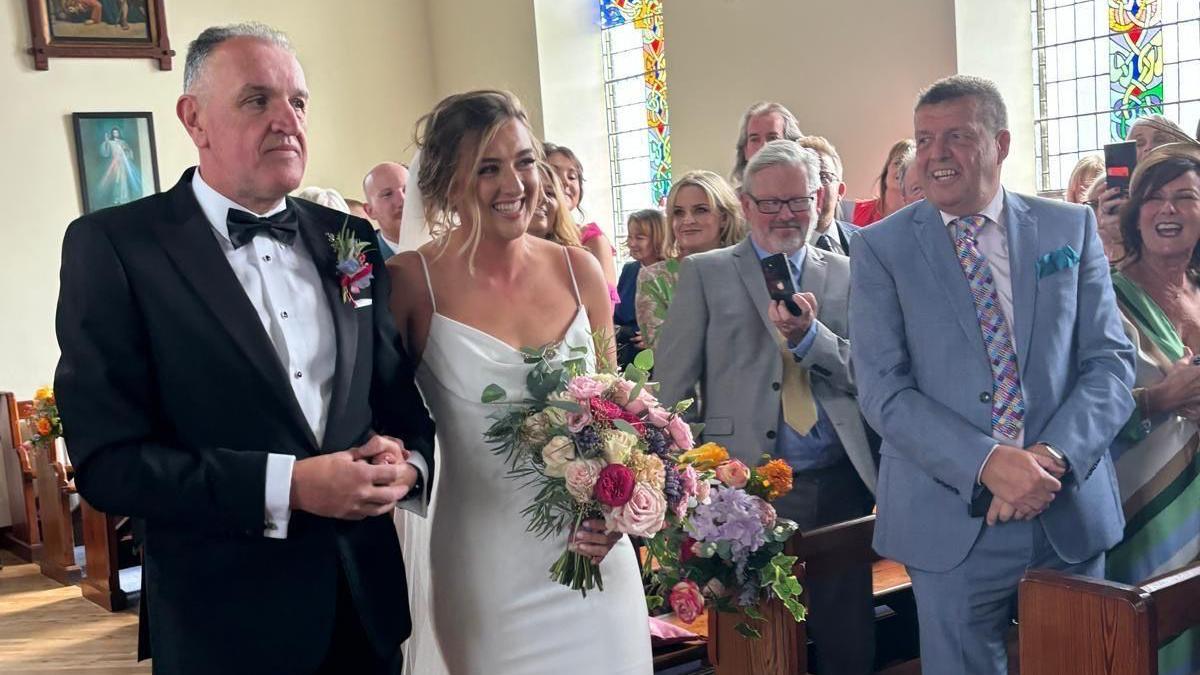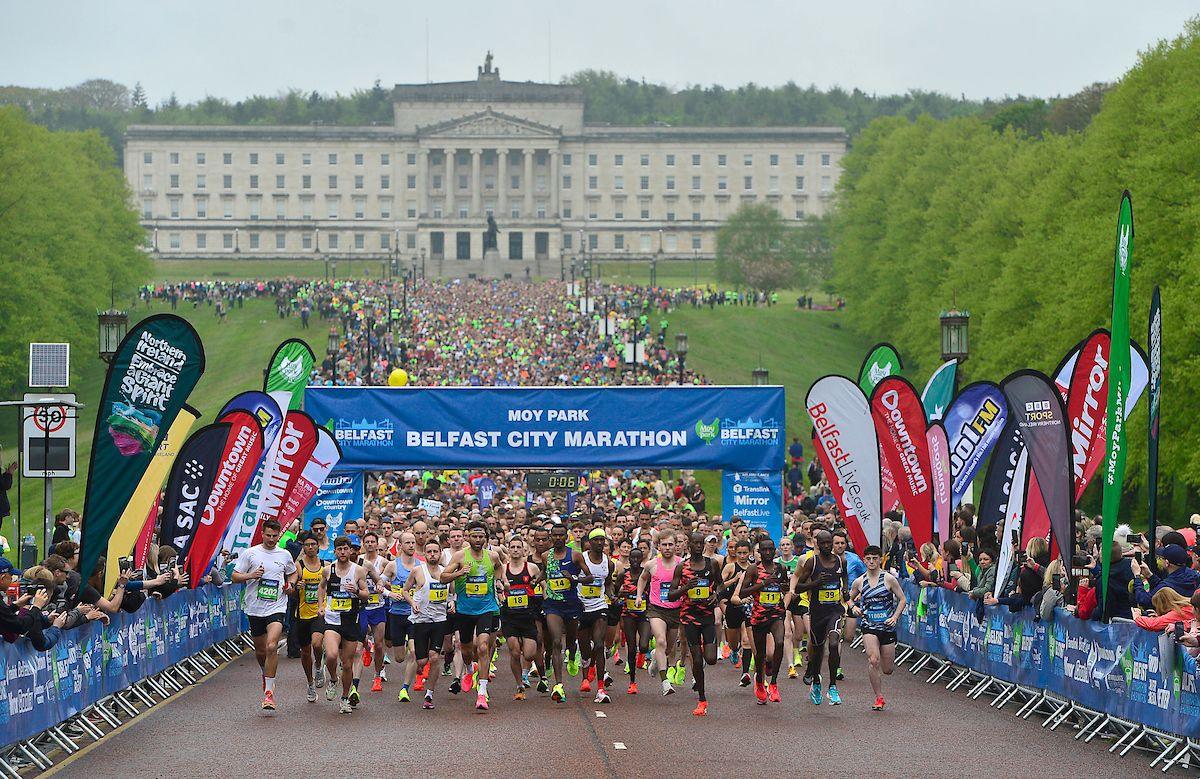Marathon runner meets spectators who saved his life
John Deery believes a series of events and a number of strangers saved his life
- Published
"My angels and stars were all aligned that day - it’s a miracle, really."
John Deery survived a cardiac arrest while running the Belfast Marathon in May. His heart stopped for six minutes.
The 63-year-old said it was the swift actions of strangers in the crowd who saved his life.
He is supporting the British Heart Foundation's call for communities across Northern Ireland to help build up a map of registered defibrillators, ensuring more lives can be saved.
A defibrillator is a device that is used to give an electric shock to the heart of someone who is suffering a cardiac arrest.
They are used - alongside resuscitation or CPR - to give the best chance of survival.
One was used on John, a former bank manager, who has run several marathons and coached at Bredagh Gaelic Club in Belfast for more than 25 years.

John Deery has no memory of collapsing
The May Day bank holiday marathon began as normal as John and his running mates left the gates of Stormont.
Photographs captured him on the route before he collapsed at the 13-mile mark at Finaghy crossroads in south Belfast.
He remembers nothing about what happened. Those who witnessed it said he stopped, leaned up against a barrier, and in a matter of moments his legs buckled and he fell to the ground.
Help from Belfast Marathon spectators
A cardiac nurse, who at the last minute changed her location to watch the marathon, went to John and placed him in the recovery position.
Unable to find a pulse, she shouted for help. A police officer dialled 999, and a cordon was thrown up around him.
A nearby defibrillator in a church could not be accessed as it was not registered with The Circuit - the national defibrillator network, which provides the NHS ambulance services with vital information about where the machines are around the UK.

Peter (right) was not meant to be passing the place where John collapsed
Peter O'Hare was not meant to be watching the Belfast Marathon.
He actually should have been taking part, but he had an injury, and instinct forced him to pull out on the morning of the race.
The 44-year-old, who works for the medical devices company Stryker and oversees their defibrillators, was driving through Finaghy when he saw someone had collapsed.
He said his training immediately kicked in.
"I went over to see if I could help," he said.
"I shouted for someone to start CPR, and I raced to get the defibrillator that I keep in the car.
"He was completely passed out; his eyes were rolling in his head, and he was clearly not breathing - essentially when you are in cardiac arrest, you are dead."
How to use a defibrillator and save a life. Video, 00:02:44
- Published23 August 2021
What do I need to know about defibrillators?
- Published23 August 2021
Call for more equal access to public defibrillators
- Published29 August 2023
Peter said he had never imagined having to resuscitate someone, and it was something he would never forget.
"I am responsible for breaking his ribs—I wasn't prepared for that—after a few compressions I could feel his chest collapse under my hands.
"That was quite frightening, but I just kept going and listening to the instructions on the defib, which talk you through what to do.
"When I was performing CPR, the machine said good compressions, and it was like having someone standing over your shoulder in a stressful situation saying, 'keep doing what you are doing, you are doing ok'."
'That's the marathon man'
John was taken by ambulance to Belfast's Royal Victoria Hospital, where he spent the next three days in intensive care.
He only realised how long he had been there when he heard a nurse saying over his bed: "That's the marathon man - he's alive."
Remarkably, the voice belonged to the CPR nurse.
John said it had been a very long day, to which the nurse told him it had been three days since they had first met.
Wiping away tears, John describes the CPR nurse, the police officer, and Peter as his angels who stepped out of the crowd to save his life.
Interviewed for the first time side-by-side, they are reliving that day to support the British Heart Foundation's (BHF) attempt to establish a circuit of properly registered defibrillators across Northern Ireland.

Since his recovery John has been able to walk his daughter down the aisle
Fearghal McKinney, head of the BHF NI, said early access to a defibrillator that is properly registered could make the difference between life and death.
The BHF is calling on everyone who has a defibrillator, whether in a public place, business, or community, to register it and be involved in creating a map of 100,000 defibrillators, external.
Just having one and hanging it up on a wall does not mean it is active.
A couple of months ago, John walked his daughter up the aisle at her wedding in Donegal.
Back doing parkrun, he said he was incredibly grateful to his family.
"The love I have for my family, who've also been traumatised, is enormous,” he said.
“Every day is about making memories.”
Related topics
Related internet links
- Published8 May 2024
